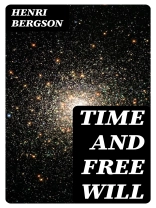In ‘Time and Free Will, ‘ Henri Bergson presents a groundbreaking exploration of the concept of time and its implications for human freedom. Written during the early 20th century, this philosophical text challenges the conventional, mechanistic understanding of time as a mere quantitative measure, instead positing that time is qualitative and experienced subjectively. Bergson employs a lyrical and nuanced style, intertwining insights from philosophy, psychology, and metaphysics to articulate his notion of ‘duration, ‘ which emphasizes the fluidity and richness of lived experience over the static, fragmented time of clocks. This work not only critiques determinism but invites readers to consider how free will can coexist with the continuity of time. Henri Bergson, a prominent French philosopher and Nobel laureate, emerged in a period marked by rapid scientific progress and a growing interest in existential questions. His background in mathematics and his keen interest in the intuitive understanding of reality informed his philosophical inquiries. ‘Time and Free Will’ reflects his belief that human consciousness must be understood through introspection and lived experience, pushing against the boundaries set by positivism. This seminal work is essential for anyone interested in philosophy, psychology, or the nature of consciousness. Bergson’s profound insights challenge our perceptions of time and freedom, making this book a compelling read for scholars and general readers alike keen to explore the depths of human experience.
Yazar hakkında
Henri Bergson (1859–1941) was a French philosopher renowned for his innovative and influential contributions to the fields of metaphysics, epistemology, and the philosophy of language, among others. His work is marked by an enduring fascination with the nature of time and consciousness, themes that he explores with depth and originality throughout his career. Born in Paris, Bergson’s education was distinguished, culminating in his attendance at the prestigious École Normale Supérieure. A gifted student, he quickly made his mark in philosophical circles with his first major work, ‘Essai sur les données immédiates de la conscience’ (1889), later translated as ‘Time and Free Will: An Essay on the Immediate Data of Consciousness.’ In this seminal text, Bergson articulates his innovative concept of ‘duration, ‘ a continuous flow of time that is deeply intertwined with one’s subjective experience, in contradistinction to the quantitative, measurable time of science. Rejecting the deterministic implications of mechanistic science, Bergson argued for the reality of free will, positing that freedom is a direct experience that can be intuited in the immediacy of consciousness. His style is marked by an eloquence and clarity that has made his works accessible and resonant outside the bounds of academic philosophy, as he sought to address the pressing intellectual and spiritual concerns of his contemporaries. He was awarded the Nobel Prize in Literature in 1927 in recognition of his rich and dynamic contributions to thought. His other notable works include ‘Matière et mémoire’ (1896) and ‘L’Évolution créatrice’ (1907), each further cementing his status as a pivotal figure in the development of 20th-century philosophy.












